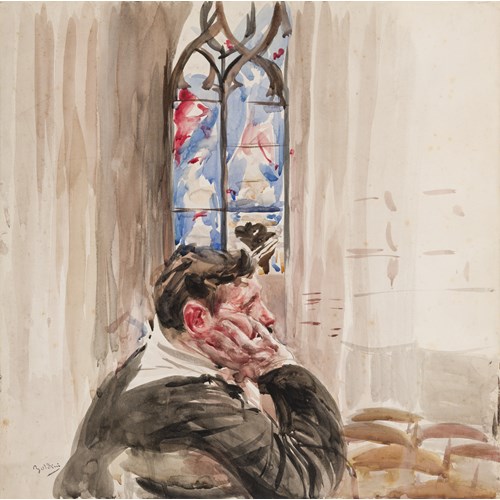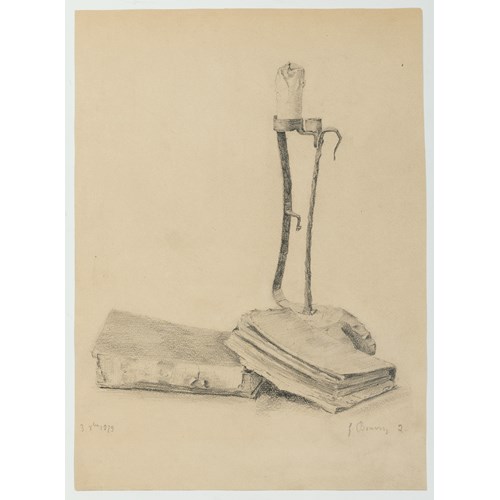Marketplace
The Head of the Virgin (Study for Consolatrix Afflictorum)
Pascal-Adolphe DAGNAN-BOUVERET
The Head of the Virgin (Study for Consolatrix Afflictorum)
Dagnan-Bouveret worked painstakingly on each of his paintings, making numerous preparatory drawings for each composition. The present sheet is a study for the head of the Virgin in the artist’s major religious painting, Consolatrix Afflictorum, painted in 1899 and today in the collection of the Frick Art and Historical Center in Pittsburgh. The monumental painting, more than twelve feet high and nine feet wide, depicts the Virgin and Child seated in a wooded landscape and flanked by three music-making angels, while a cowering man, representing human suffering, is shown at the foot of the composition. Dagnan-Bouveret seems to have been thinking of the painting in December 1897, when he wrote to his wife that ‘I have a theme that would involve me, a type of Madonna of the Afflicted, which I think I have already discussed with you.’ The artist seems to have wanted to contrast the calmness of the pastoral setting and the innocent, gentle animals surrounding the Madonna and her attendant angels with the suffering man lying prostrate at her feet.
The American collector Henry Clay Frick had agreed to buy the painting of Consolatrix Afflictorum (Comforter of the Afflicted) for the sum of $22,000 from the art dealers Arthur Tooth & Sons in 1898, before Dagnan-Bouveret had even begun working on it. It was one of three large-scale paintings by Dagnan-Bouveret acquired between 1898 and 1901 by Frick, the others being Christ and the Disciples at Emmaus, painted in 1896-1897, and a commissioned portrait of his son Childs Frick, completed around 1899. Exhibited as part of a small retrospective exhibition of eight of Dagnan-Bouveret’s works at the Paris Exposition Universelle of 1900, for which the artist won the Grand Prix, Consolatrix Afflictorum was delivered the following year to Frick, who hung it in the dining room of his Pittsburgh estate, Clayton, where it remained after his eventual move to New York in 1914. A reproductive etching by Léopold Flameng after the painting of Consolatrix Afflictorum was published by Arthur Tooth & Sons around 1903.
A closely-related preparatory oil sketch on paper for the head of the Virgin in Consolatrix Afflictorum is in the collection of the Musée Georges-Garret in Vesoul. Other studies for the composition of the painting are known, including an early compositional sketch in pastel, gouache and ink in a private collection, and an oil sketch for the seated Christ Child, which is also in the Frick Art and Historical Center in Pittsburgh.
The American collector Henry Clay Frick had agreed to buy the painting of Consolatrix Afflictorum (Comforter of the Afflicted) for the sum of $22,000 from the art dealers Arthur Tooth & Sons in 1898, before Dagnan-Bouveret had even begun working on it. It was one of three large-scale paintings by Dagnan-Bouveret acquired between 1898 and 1901 by Frick, the others being Christ and the Disciples at Emmaus, painted in 1896-1897, and a commissioned portrait of his son Childs Frick, completed around 1899. Exhibited as part of a small retrospective exhibition of eight of Dagnan-Bouveret’s works at the Paris Exposition Universelle of 1900, for which the artist won the Grand Prix, Consolatrix Afflictorum was delivered the following year to Frick, who hung it in the dining room of his Pittsburgh estate, Clayton, where it remained after his eventual move to New York in 1914. A reproductive etching by Léopold Flameng after the painting of Consolatrix Afflictorum was published by Arthur Tooth & Sons around 1903.
A closely-related preparatory oil sketch on paper for the head of the Virgin in Consolatrix Afflictorum is in the collection of the Musée Georges-Garret in Vesoul. Other studies for the composition of the painting are known, including an early compositional sketch in pastel, gouache and ink in a private collection, and an oil sketch for the seated Christ Child, which is also in the Frick Art and Historical Center in Pittsburgh.
Provenance: Private collection, New York
Thence by family descent
Anonymous sale (‘Property of a Lady, New York’), New York, Sotheby’s, 31 January 2020, lot 424
Gallery 19C, Westlake, Texas
Private collection, North Carolina.
Plus d'œuvres d'art de la Galerie


_T638373222797209781.jpg?width=2000&height=2000&mode=max&scale=both&qlt=90)





_T638325541441685715.jpg?width=500&height=500&mode=pad&scale=both&qlt=90&format=jpg)
